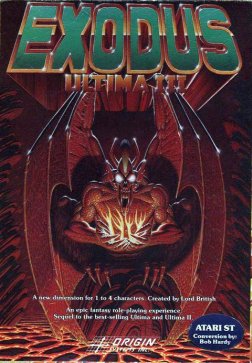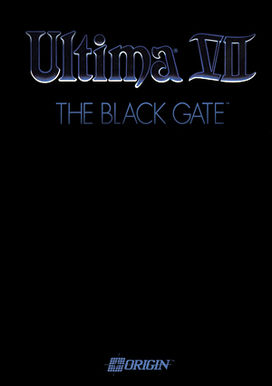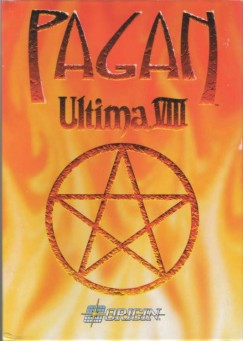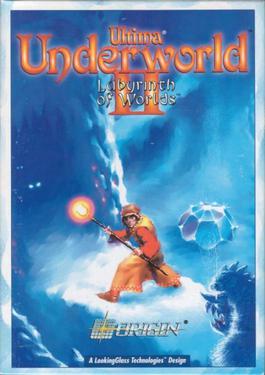
Ultima is a series of open world fantasy role-playing video games from Origin Systems, created by Richard Garriott. Electronic Arts has owned the brand since 1992. The series had sold over 2 million copies by 1997.
Dragon Quest, previously published as Dragon Warrior in North America until 2005, is a series of role-playing games created by Japanese game designer Yuji Horii, character designer Akira Toriyama, and composer Koichi Sugiyama and published by Square Enix. Since its inception, development of games in the series have been outsourced to a plethora of external companies until the tenth installment, with localized remakes and ports of later installments for the Nintendo DS, Nintendo 3DS, and Nintendo Switch being published by Nintendo outside of Japan. With its first game published in 1986, there are eleven main-series games, along with numerous spin-off games. In addition, there have been numerous manga, anime and novels published under the franchise, with nearly every game in the main series having a related adaptation.

Origin Systems, Inc. was an American video game developer based in Austin, Texas. It was founded on March 3, 1983, by Richard Garriott and his brother Robert. Origin is best known for their groundbreaking work in multiple genres of video games, such as the Ultima and Wing Commander series. The company was purchased by Electronic Arts in 1992.

Warren Evan Spector is an American role-playing and video game designer, director, writer, producer and production designer. He is known for creating immersive sim games, which give players a wide variety of choices in how to progress. Consequences of those choices are then shown in the simulated game world in subsequent levels or missions. He is best known for the critically acclaimed video game Deus Ex that embodies the choice and consequence philosophy while combining elements of the first-person shooter, role-playing, and adventure game genres. In addition to Deus Ex, Spector is known for his work while employed by Looking Glass Studios, where he was involved in the creation of several acclaimed titles including Ultima Underworld, Ultima Underworld II, System Shock, and Thief: The Dark Project. He is employed by OtherSide Entertainment, where he was part of the development team for the stalled System Shock 3. He is currently working on a new immersive sim based on an original intellectual property.

Ultima III: Exodus is the third game in the series of Ultima role-playing video games. Exodus is also the name of the game's principal antagonist. It is the final installment in the "Age of Darkness" trilogy. Released in 1983, it was the first Ultima game published by Origin Systems. Originally developed for the Apple II, Exodus was eventually ported to 13 other platforms, including a NES/Famicom remake.

Ultima IV: Quest of the Avatar, first released in 1985 for the Apple II, is the fourth in the series of Ultima role-playing video games. It is the first in the "Age of Enlightenment" trilogy, shifting the series from the hack and slash, dungeon crawl gameplay of its "Age of Darkness" predecessors towards an ethically nuanced, story-driven approach. Ultima IV has a much larger game world than its predecessors, with an overworld map sixteen times the size of Ultima III and puzzle-filled dungeon rooms to explore. Ultima IV further advances the franchise with dialog improvements, new means of travel and exploration, and world interactivity.

Ultima VI: The False Prophet, released by Origin Systems in 1990, is the sixth part in the role-playing video game series of Ultima. It is the third and final game in the "Age of Enlightenment" trilogy. Ultima VI sees the player return to Britannia, at war with a race of gargoyles from another land, struggling to stop a prophecy from ending their race. The player must help defend Britannia against these gargoyles, and ultimately discover the secrets about both lands and its peoples.

Ultima VII: The Black Gate is the seventh installment of the Ultima series of role-playing video games, released in April 1992. In it, the player returns as The Avatar, a would-be paragon of moral virtue who faces down many dangers and deceptions in order to cleanse the medieval fantasy world of Britannia of assorted plots and schemes, monster infestations, and the undermining of crown authority.

Ultima VIII: Pagan is a role-playing video game, released as the eighth part of the Ultima series. Released in 1994, it is a DOS-only title and is also the first game in the series to be rated M in North America. It was not as well-received as its predecessors, Ultima VII and Ultima VII Part Two: Serpent Isle.

Ultima IX: Ascension is a 1999 role-playing video game developed by Origin Systems and published by Electronic Arts for Microsoft Windows. It is the ninth and final main installment of the Ultima series.

Ultima VII Part Two: Serpent Isle is a role-playing video game released in 1993 as part of the core Ultima series, its story beginning eighteen months after the conclusion of Ultima VII: The Black Gate. In Serpent Isle, the Avatar follows Batlin to the eponymous land called Serpent Isle, finding three city-states founded by those who left Britannia generations before and ancient ruins from a still-older lost civilization that was there long before them.

Ultima Underworld: The Stygian Abyss is a first-person role-playing video game developed by Blue Sky Productions and published by Origin Systems. Released in March 1992, the game is set in the fantasy world of the Ultima series. It takes place inside the Great Stygian Abyss: a large cave system that contains the remnants of a failed utopian civilization. The player assumes the role of the Avatar—the Ultima series's protagonist—and attempts to find and rescue a baron's kidnapped daughter.

Ultima Underworld II: Labyrinth of Worlds is a 1993 first-person role-playing video game developed by LookingGlass Technologies and published by Origin Systems. As the sequel to Ultima Underworld: The Stygian Abyss, the game is set in the Ultima fantasy universe. Players assume the role of the Avatar—the protagonist of the Ultima series—and adventure through multiple dimensions while seeking to prevent the evil Guardian from achieving world domination. Progression is largely nonlinear and the game allows for emergent gameplay.

Worlds of Ultima: The Savage Empire is a role-playing video game, part in the Ultima series, published in 1990. It is considered a Worlds of Ultima game, as its setting differs from that of the main series. It uses the same engine as Ultima VI: The False Prophet and Martian Dreams. On June 18, 2012, Electronic Arts released the game as freeware through GOG.com.

Fujisankei Communications International, Inc. (FCI) is the American arm of the Fujisankei Communications Group, a Japanese media conglomerate of television and radio channels, magazine, newspaper, record and video game companies. The Fujisankei Communications Group regroups more than 90 companies, like Fuji TV in Japan, among others. Founded in 1986 in New York City and owned by Fuji Media Holdings, FCI makes productions from the Fujisankei Communications Group available to the United States and the rest of the western world.
David R. Watson (1948-) is a bowyer currently living in Austin, Texas. He has composed music for the Ultima series, including "Stones". Watson is a fencing master, a composer, and musician; and has a varied career of video game support including level designer in X-COM: Apocalypse, lead mission analyst in Grand Theft Auto: San Andreas, and music composer in Ultima.
Mike McShaffry is a video game programmer, entrepreneur and author. He is known as the director of Ultima VIII: Pagan. He graduated from the University of Houston and began his video game industry career working for Origin Systems in 1990. He worked on titles such as Martian Dreams, Ultima VII: The Black Gate, Ultima VIII: Pagan, Ultima IX: Ascension and Ultima Online. In 1997 he formed his own company Tornado Alley. He has since worked at Glass Eye Entertainment, producing Microsoft Casino.
Kirk Winterrowd is an American video game music composer and musician, best known for his work for Origin Systems, namely several of the Ultima titles. He also served as a voice actor in Ultima VIII: Pagan.
Denis Loubet is an artist who has worked on several pen-and-paper role-playing games and video games, including the MMORPG Ashen Empires.













